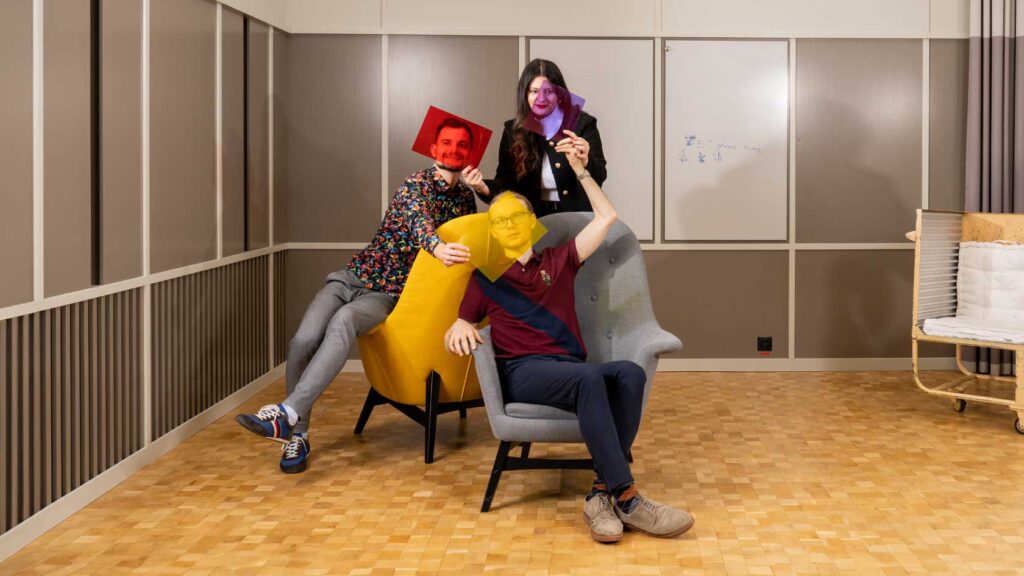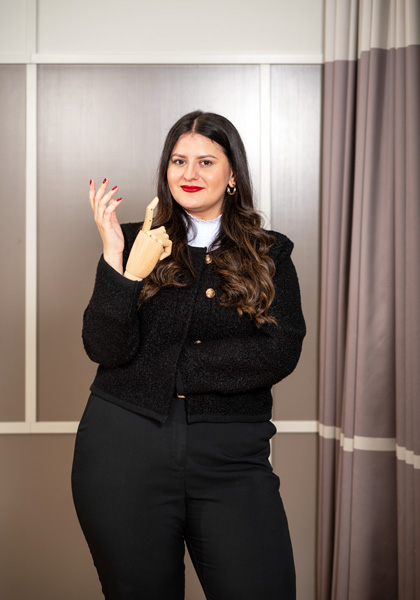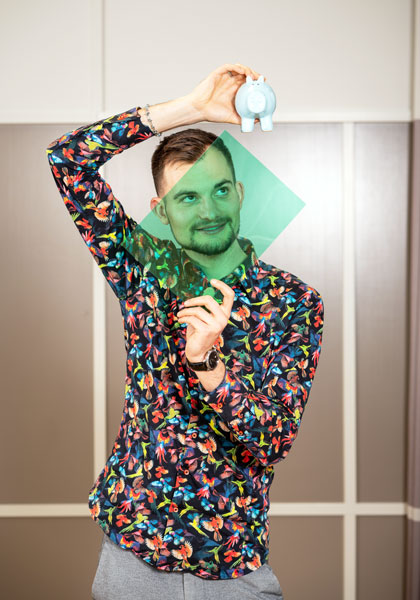
UZH students and researchers from a wide range of disciplines explored solutions to societal challenges at the Innovators Camp organized by the UZH Innovation Office last year and during a pilot project for a new study program. These challenges ranged from checking the anatomical correctness of AI-generated images of the body and reducing the energy consumption of Zurich’s inhabitants, to assessing the impact of virtual reality on our behavior and enabling people in Zurich to consume greener and smarter.
It’s important that every team member is aware of their own skills and proactively seeks to utilize them in the right place. Assigning tasks according to individual strengths is the basis of efficient teamwork.
“In business, collaboration in transdisciplinary teams has long been important,” says Titus Neupert, co-director of the UZH Digital Society Initiative (DSI) and professor of theoretical physics, “and in basic research, too, it is increasingly common for findings to be a team effort.” But in the course catalogue, the range of transdisciplinary programs on offer is currently “very scant”, as Neupert puts it. The new minor program in Digital Skills, which is open to Master’s students across all faculties from fall 2024, is intended to remedy this. Challenge-based innovation allows students to gain experience in developing novel ideas in a short space of time in transdisciplinary teams. And they can also acquire transferable skills that will help them identify solutions to complex problems in their working lives.
What’s the problem?
Titus Neupert developed the program in collaboration with Ursula Brack from the DSI. A pilot module during the last Fall Semester trialed the method of allowing students from various disciplines to work on concrete questions autonomously. “Normally in a course, the problem is presented, along with the method of finding the solution and the solution itself,” explains Till Baier, a Master’s student in political communication and governance, who took part in the pilot. “In this module, we had to work everything out ourselves: define the problem, devise the method and find the solution.”
Setting out the problem you want to work on is the first challenge. The featured challenges revolve around major societal problems and are formulated quite broadly. Breaking them down into tangible and workable solutions takes time and lengthy discussion. As Marius Décaillet, a Master’s student in economics, recalls, defining the idea was the hardest bit. Last year, he took part in the UZH Innovators Camp, which is co-organized by the UZH Innovation Hub and Zurich University of the Arts. On the basis of a five-year development plan for the city of Zurich, students had to come up with specific solutions to specific questions at two weekend sessions spread over five weeks.
We faced practical challenges and problems, which spark interest and encourage creativity. It’s a really refreshing way to study.
Marius Décaillet and his team worked on the topic of energy with the aim of reducing consumption by private households in the city. Décaillet describes a brainstorming method they learned called Crazy Eights, where every team member had to write down eight ideas on the topic in eight minutes. The list was then gradually narrowed down to pick the best idea. “If we’d only been asked to come up with two ideas, they wouldn’t have been the same ones as with this method,” says Décaillet. “It forced us to really think outside the box and be creative.”
Sierra Deutsch, an Innovators Camp participant, postdoc and group leader at the Department of Geography, explains how the exercise made students think about other people’s ideas as well as their own, involving the team as a whole. She explains how academics are taught to promote and advocate their own ideas first and foremost. By contrast, the Innovators Camp gave them the opportunity to test out in a hands-on way how solutions come about when a team is left to exchange ideas and put their heads together.
Doing what they do best
The students worked on tangible solutions to societal challenges at the Innovators Camp. “What matters is the process and teaching students to work together in interdisciplinary teams to solve problems,” explains Manuel Merki from the UZH Innovation Office. But because they don’t (yet) have to launch real products on the market, they have a certain amount of freedom to learn how their research can benefit society. This is designed to enable them to set up university start-ups that will impact society in future.
Getting the three to six students from different disciplines to work well as a team is just one of the elements of challenge-based innovation. “We didn’t know each other and had to quickly find a way to work together efficiently,” says Hatice Kübra Parmaksiz, a Master’s student in economics who took part in the Digital Skills pilot. Initially, they did a lot of work in parallel, in other words, they were duplicating their effort. “Someone should have allocated the tasks, but there was no hierarchy in the team. That made us less efficient at first,” says Parmaksiz. As the project progressed, however, the team members increasingly showed initiative: everyone took on the tasks that matched their strengths of their own accord. What also helped was that every week someone was given responsibility to lead.
If everyone works toward the same goal, we can identify good solutions in a very short space of time.
Different ways of working and methods in the various scientific disciplines was an additional challenge. “For example, I discussed the right statistical method at length with a business and economics student in our team,” recalls Till Baier. Both students argued in favor of their own familiar method and criticized the shortcomings of the other unknown one from outside their subject area. They eventually realized that neither method suited the issue at hand, and they had to seek help from another discipline – psychology. The challenge turned out to be an opportunity, and for Baier an important lesson: “Without the in-depth exchange of ideas, we would never have thought of asking for outside help, and instead would have just used our tried and tested methods from our own disciplines.”
Broadening horizons
These kinds of insights are what the Minor Digital Skills is about. “Merely seeing that there are different methods and ways of doing things broadens students’ horizons,” explains Neupert. Because the challenges concern cross-cutting areas that cover several disciplines – such as AI, medicine and ethics – they are tackled in a different way than if we were to delve into an issue from the perspective of one subject area. “We’re at the intersection of various fields, and this is relatively uncharted territory in scientific terms,” explains Neupert. We can contribute something new and interesting just by combining methods and perspectives that would otherwise not be put together, he says.
Neupert considers the pilot project a success: “Some of the outcomes are methodologically quite detailed, although there wasn’t much time to engage with them.” Neupert believes the discussion across disciplinary boundaries is particularly valuable and an important experience to help prepare students for the world of work. There too, it’s important that for example lawyers and computer scientists understand each other. He sees formats such as challenge-based innovation as game-changers for university teaching: “The distinguishing feature will be how we enable and empower people to work together so they can come up with novel solutions.”
This article is part of the UZH Magazin 1/24 on gender medicine.
Text: Theo von Däniken, Photos: Diana Ulrich, Translation: Gemma Brown


